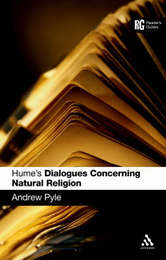
|
Hume's 'Dialogues Concerning Natural Religion': A Reader's Guide
Paperback / softback
Main Details
| Title |
Hume's 'Dialogues Concerning Natural Religion': A Reader's Guide
|
| Authors and Contributors |
By (author) Dr. Andrew Pyle
|
| Series | Reader's Guides |
|---|
| Physical Properties |
| Format:Paperback / softback | | Pages:164 | | Dimensions(mm): Height 216,Width 138 |
|
| Category/Genre | Philosophy of religion |
|---|
| ISBN/Barcode |
9780826475688
|
| Classifications | Dewey:210 |
|---|
| Audience | |
|---|
|
Publishing Details |
| Publisher |
Bloomsbury Publishing PLC
|
| Imprint |
Continuum International Publishing Group Ltd.
|
| Publication Date |
9 November 2006 |
| Publication Country |
United Kingdom
|
Description
Hume's Dialogues provide a classic exposition and critique of the famous 'Argument to Design', the attempt to prove the existence and properties of a designing intelligence or God from the phenomena of Nature, notably the functional contrivance of the parts of plants and animals. As such, it raises questions of central interest in both philosophy and theology. This is a hugely important and exciting, yet challenging, piece of philosophical writing. In Hume's Dialogues Concerning Natural Religion: A Reader's Guide, Andrew Pyle explains the philosophical and theological background against which the book was written, including what is meant by 'natural' religion. He goes on to address the question of why Hume chose to write in dialogue form, sketches out the views of the three characters and introduces the questions they address. The book then takes the 12 parts of the Dialogues in turn and guides the reader to a clear understanding of the text as a whole. This is the ideal companion to study of this most influential and challenging of texts.
Author Biography
Andrew Pyle is at the University of Bristol, UK. Andrew Pyle is Senior Lecturer in Philosophy at the Universtiy of Bristol, UK.
Reviews"This account of Hume's personal position has considerable plausibility, and the judicious way in which it is articulated by Pyle is representative of the overall merits of his book. Pyle consistently manages to combine clear exegetical guidance with a thoughtful presentation of alternative interpretations of Hume's intentions, and he also pulls off the feat of providing straightforward clarifications of specific argumentative moves in the Dialogues while developing in the background a unifying interpretation that will interest even people engaged in scholarly research on Hume's thinking about religion." -Alan Bailey, Philosophy in Review
|